Case Study Analysis: Business and Corporate Law (LAW6000)
VerifiedAdded on 2022/10/02
|12
|2852
|26
Case Study
AI Summary
This case study analysis delves into various aspects of business and corporate law, addressing legal issues arising from several scenarios. The analysis covers contract law, agency law, and director's duties under the Corporations Act 2001 (Cth). The document examines the enforceability of contracts based on the Heads of Agreement, considering conditions and breaches. It also explores the liabilities of directors, including breach of duty of care, conflict of interest, and insolvent trading. Furthermore, the case study considers the application of the business judgment rule. The agency law section assesses the scope of an agent's authority and the consequences of exceeding that authority. The analysis includes relevant case law, such as L'Estrange v F Graucob Ltd, Masters v Cameron, and Mitor Investments Pty Ltd v General Accident Fire E Life Assurance Corp Ltd, to support the legal arguments and conclusions. The document provides a comprehensive examination of the legal principles and their application to the given facts, offering practical advice and conclusions for each case study question.
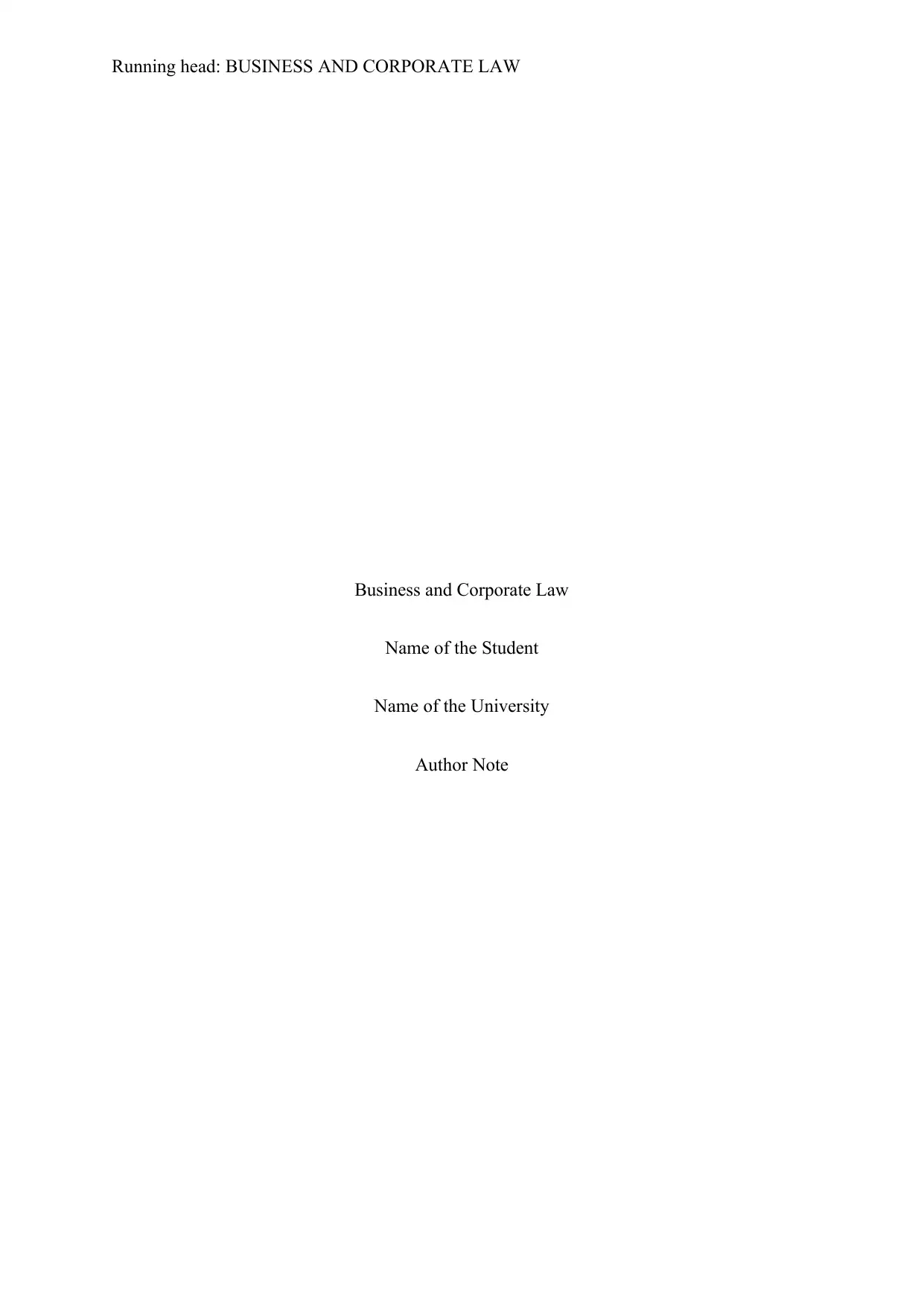
Running head: BUSINESS AND CORPORATE LAW
Business and Corporate Law
Name of the Student
Name of the University
Author Note
Business and Corporate Law
Name of the Student
Name of the University
Author Note
Paraphrase This Document
Need a fresh take? Get an instant paraphrase of this document with our AI Paraphraser
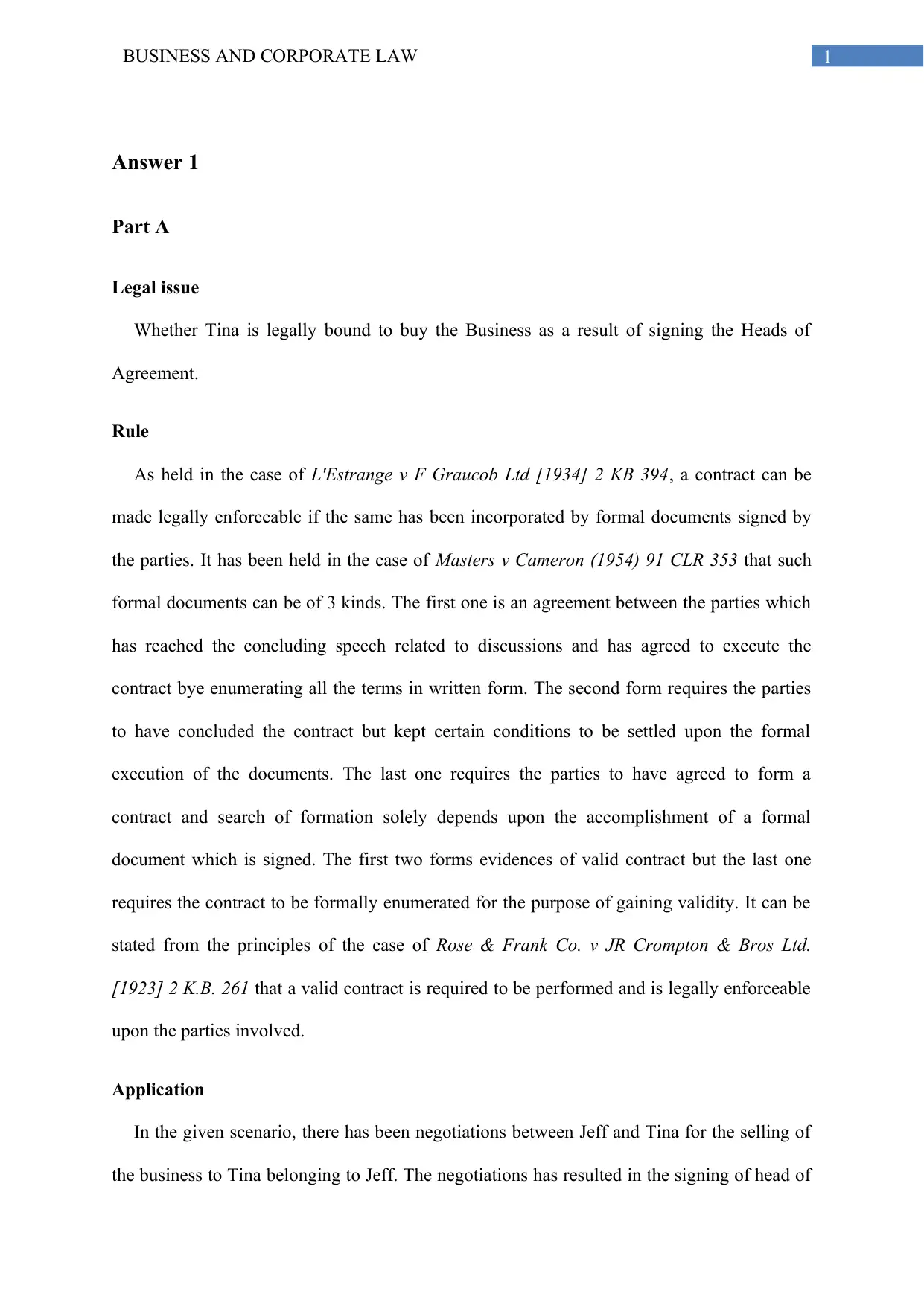
1BUSINESS AND CORPORATE LAW
Answer 1
Part A
Legal issue
Whether Tina is legally bound to buy the Business as a result of signing the Heads of
Agreement.
Rule
As held in the case of L'Estrange v F Graucob Ltd [1934] 2 KB 394, a contract can be
made legally enforceable if the same has been incorporated by formal documents signed by
the parties. It has been held in the case of Masters v Cameron (1954) 91 CLR 353 that such
formal documents can be of 3 kinds. The first one is an agreement between the parties which
has reached the concluding speech related to discussions and has agreed to execute the
contract bye enumerating all the terms in written form. The second form requires the parties
to have concluded the contract but kept certain conditions to be settled upon the formal
execution of the documents. The last one requires the parties to have agreed to form a
contract and search of formation solely depends upon the accomplishment of a formal
document which is signed. The first two forms evidences of valid contract but the last one
requires the contract to be formally enumerated for the purpose of gaining validity. It can be
stated from the principles of the case of Rose & Frank Co. v JR Crompton & Bros Ltd.
[1923] 2 K.B. 261 that a valid contract is required to be performed and is legally enforceable
upon the parties involved.
Application
In the given scenario, there has been negotiations between Jeff and Tina for the selling of
the business to Tina belonging to Jeff. The negotiations has resulted in the signing of head of
Answer 1
Part A
Legal issue
Whether Tina is legally bound to buy the Business as a result of signing the Heads of
Agreement.
Rule
As held in the case of L'Estrange v F Graucob Ltd [1934] 2 KB 394, a contract can be
made legally enforceable if the same has been incorporated by formal documents signed by
the parties. It has been held in the case of Masters v Cameron (1954) 91 CLR 353 that such
formal documents can be of 3 kinds. The first one is an agreement between the parties which
has reached the concluding speech related to discussions and has agreed to execute the
contract bye enumerating all the terms in written form. The second form requires the parties
to have concluded the contract but kept certain conditions to be settled upon the formal
execution of the documents. The last one requires the parties to have agreed to form a
contract and search of formation solely depends upon the accomplishment of a formal
document which is signed. The first two forms evidences of valid contract but the last one
requires the contract to be formally enumerated for the purpose of gaining validity. It can be
stated from the principles of the case of Rose & Frank Co. v JR Crompton & Bros Ltd.
[1923] 2 K.B. 261 that a valid contract is required to be performed and is legally enforceable
upon the parties involved.
Application
In the given scenario, there has been negotiations between Jeff and Tina for the selling of
the business to Tina belonging to Jeff. The negotiations has resulted in the signing of head of
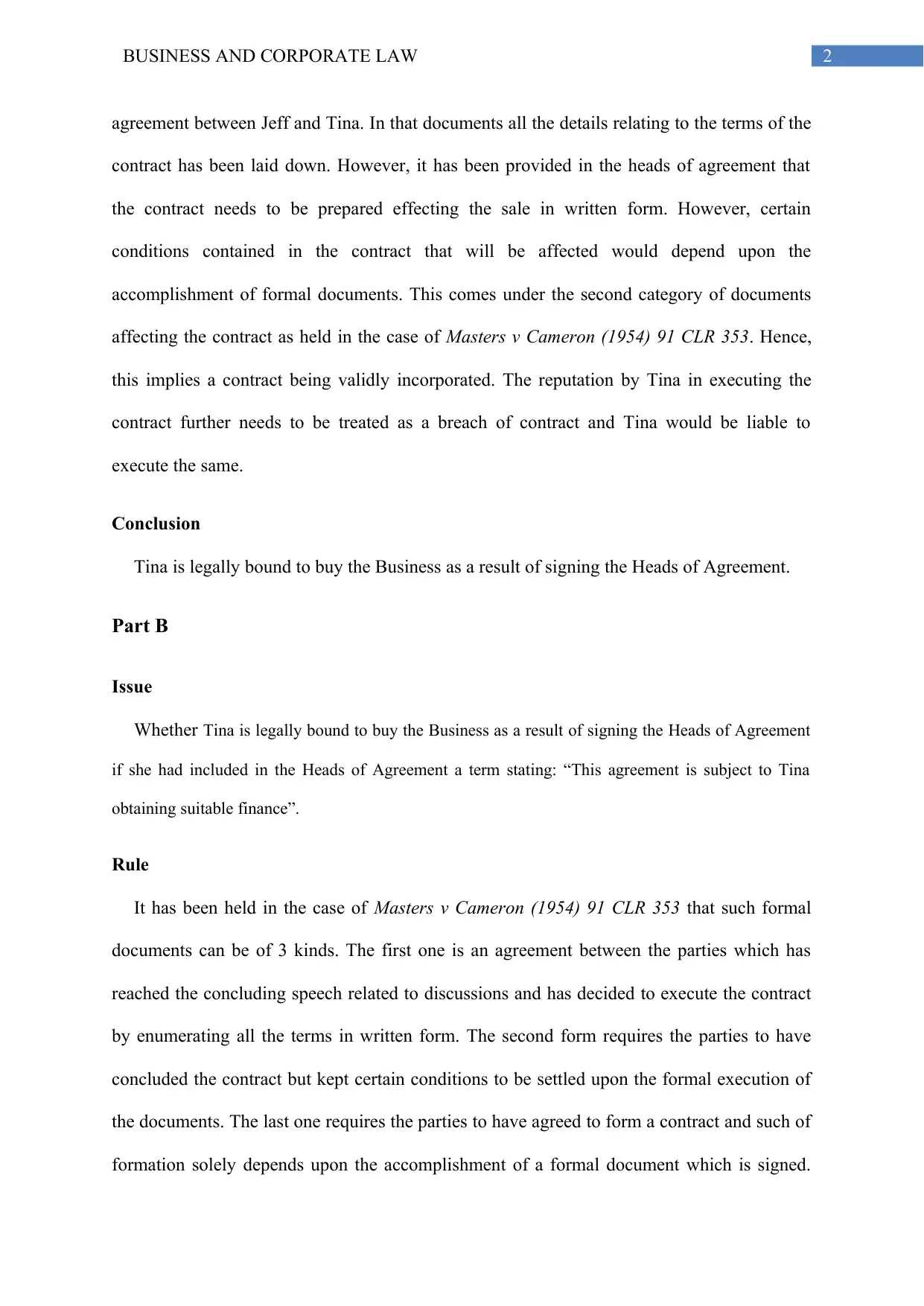
2BUSINESS AND CORPORATE LAW
agreement between Jeff and Tina. In that documents all the details relating to the terms of the
contract has been laid down. However, it has been provided in the heads of agreement that
the contract needs to be prepared effecting the sale in written form. However, certain
conditions contained in the contract that will be affected would depend upon the
accomplishment of formal documents. This comes under the second category of documents
affecting the contract as held in the case of Masters v Cameron (1954) 91 CLR 353. Hence,
this implies a contract being validly incorporated. The reputation by Tina in executing the
contract further needs to be treated as a breach of contract and Tina would be liable to
execute the same.
Conclusion
Tina is legally bound to buy the Business as a result of signing the Heads of Agreement.
Part B
Issue
Whether Tina is legally bound to buy the Business as a result of signing the Heads of Agreement
if she had included in the Heads of Agreement a term stating: “This agreement is subject to Tina
obtaining suitable finance”.
Rule
It has been held in the case of Masters v Cameron (1954) 91 CLR 353 that such formal
documents can be of 3 kinds. The first one is an agreement between the parties which has
reached the concluding speech related to discussions and has decided to execute the contract
by enumerating all the terms in written form. The second form requires the parties to have
concluded the contract but kept certain conditions to be settled upon the formal execution of
the documents. The last one requires the parties to have agreed to form a contract and such of
formation solely depends upon the accomplishment of a formal document which is signed.
agreement between Jeff and Tina. In that documents all the details relating to the terms of the
contract has been laid down. However, it has been provided in the heads of agreement that
the contract needs to be prepared effecting the sale in written form. However, certain
conditions contained in the contract that will be affected would depend upon the
accomplishment of formal documents. This comes under the second category of documents
affecting the contract as held in the case of Masters v Cameron (1954) 91 CLR 353. Hence,
this implies a contract being validly incorporated. The reputation by Tina in executing the
contract further needs to be treated as a breach of contract and Tina would be liable to
execute the same.
Conclusion
Tina is legally bound to buy the Business as a result of signing the Heads of Agreement.
Part B
Issue
Whether Tina is legally bound to buy the Business as a result of signing the Heads of Agreement
if she had included in the Heads of Agreement a term stating: “This agreement is subject to Tina
obtaining suitable finance”.
Rule
It has been held in the case of Masters v Cameron (1954) 91 CLR 353 that such formal
documents can be of 3 kinds. The first one is an agreement between the parties which has
reached the concluding speech related to discussions and has decided to execute the contract
by enumerating all the terms in written form. The second form requires the parties to have
concluded the contract but kept certain conditions to be settled upon the formal execution of
the documents. The last one requires the parties to have agreed to form a contract and such of
formation solely depends upon the accomplishment of a formal document which is signed.
⊘ This is a preview!⊘
Do you want full access?
Subscribe today to unlock all pages.

Trusted by 1+ million students worldwide
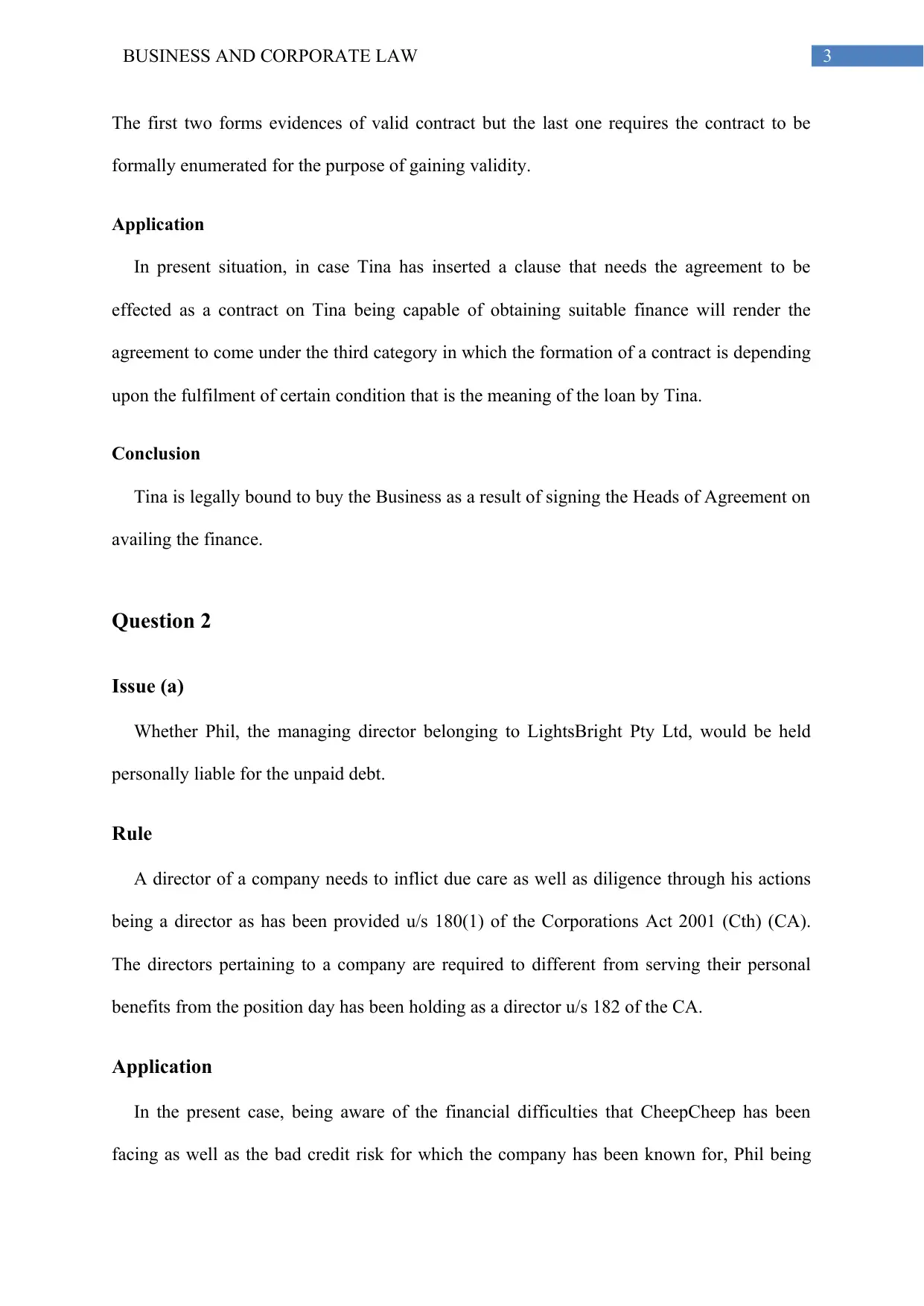
3BUSINESS AND CORPORATE LAW
The first two forms evidences of valid contract but the last one requires the contract to be
formally enumerated for the purpose of gaining validity.
Application
In present situation, in case Tina has inserted a clause that needs the agreement to be
effected as a contract on Tina being capable of obtaining suitable finance will render the
agreement to come under the third category in which the formation of a contract is depending
upon the fulfilment of certain condition that is the meaning of the loan by Tina.
Conclusion
Tina is legally bound to buy the Business as a result of signing the Heads of Agreement on
availing the finance.
Question 2
Issue (a)
Whether Phil, the managing director belonging to LightsBright Pty Ltd, would be held
personally liable for the unpaid debt.
Rule
A director of a company needs to inflict due care as well as diligence through his actions
being a director as has been provided u/s 180(1) of the Corporations Act 2001 (Cth) (CA).
The directors pertaining to a company are required to different from serving their personal
benefits from the position day has been holding as a director u/s 182 of the CA.
Application
In the present case, being aware of the financial difficulties that CheepCheep has been
facing as well as the bad credit risk for which the company has been known for, Phil being
The first two forms evidences of valid contract but the last one requires the contract to be
formally enumerated for the purpose of gaining validity.
Application
In present situation, in case Tina has inserted a clause that needs the agreement to be
effected as a contract on Tina being capable of obtaining suitable finance will render the
agreement to come under the third category in which the formation of a contract is depending
upon the fulfilment of certain condition that is the meaning of the loan by Tina.
Conclusion
Tina is legally bound to buy the Business as a result of signing the Heads of Agreement on
availing the finance.
Question 2
Issue (a)
Whether Phil, the managing director belonging to LightsBright Pty Ltd, would be held
personally liable for the unpaid debt.
Rule
A director of a company needs to inflict due care as well as diligence through his actions
being a director as has been provided u/s 180(1) of the Corporations Act 2001 (Cth) (CA).
The directors pertaining to a company are required to different from serving their personal
benefits from the position day has been holding as a director u/s 182 of the CA.
Application
In the present case, being aware of the financial difficulties that CheepCheep has been
facing as well as the bad credit risk for which the company has been known for, Phil being
Paraphrase This Document
Need a fresh take? Get an instant paraphrase of this document with our AI Paraphraser
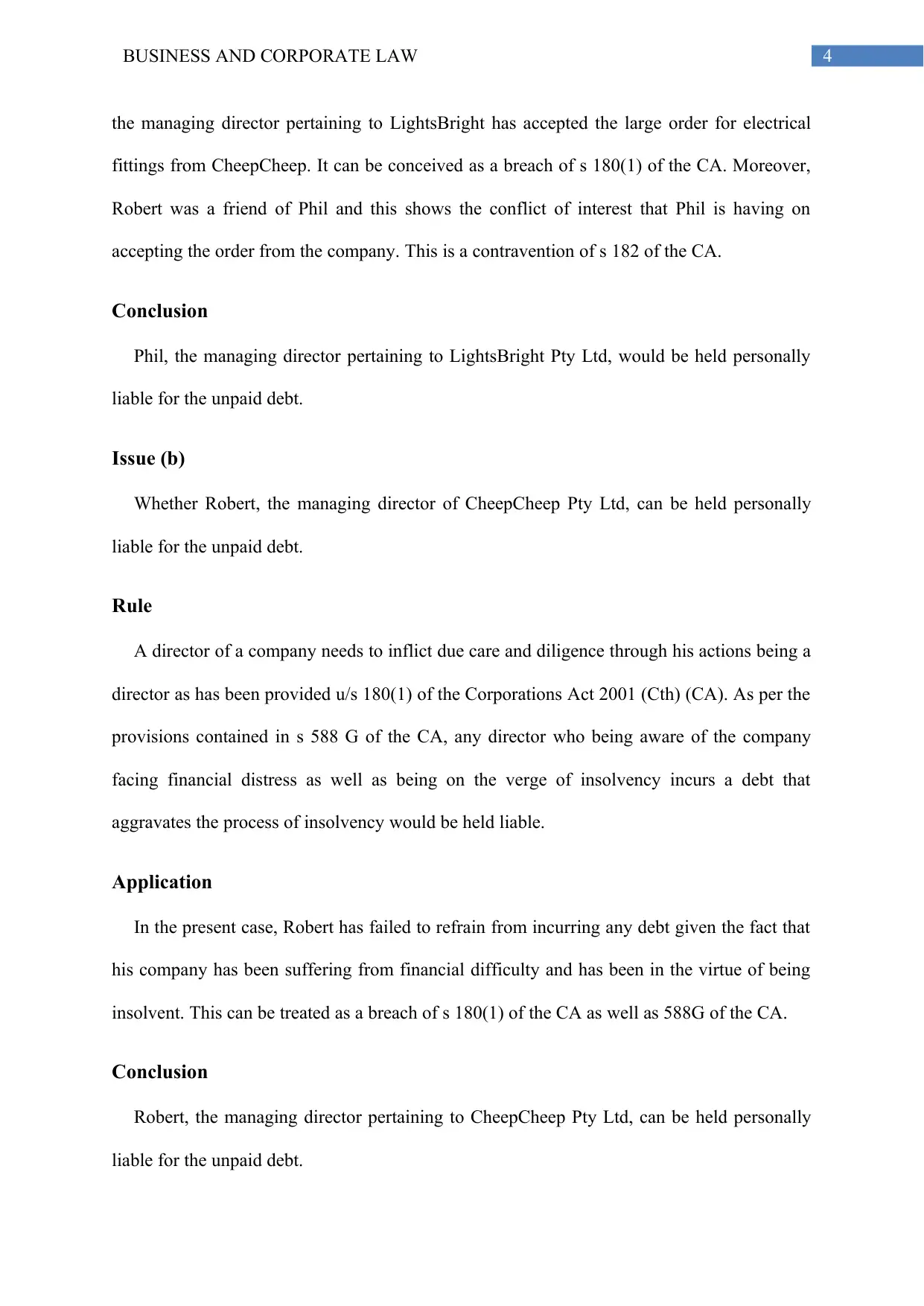
4BUSINESS AND CORPORATE LAW
the managing director pertaining to LightsBright has accepted the large order for electrical
fittings from CheepCheep. It can be conceived as a breach of s 180(1) of the CA. Moreover,
Robert was a friend of Phil and this shows the conflict of interest that Phil is having on
accepting the order from the company. This is a contravention of s 182 of the CA.
Conclusion
Phil, the managing director pertaining to LightsBright Pty Ltd, would be held personally
liable for the unpaid debt.
Issue (b)
Whether Robert, the managing director of CheepCheep Pty Ltd, can be held personally
liable for the unpaid debt.
Rule
A director of a company needs to inflict due care and diligence through his actions being a
director as has been provided u/s 180(1) of the Corporations Act 2001 (Cth) (CA). As per the
provisions contained in s 588 G of the CA, any director who being aware of the company
facing financial distress as well as being on the verge of insolvency incurs a debt that
aggravates the process of insolvency would be held liable.
Application
In the present case, Robert has failed to refrain from incurring any debt given the fact that
his company has been suffering from financial difficulty and has been in the virtue of being
insolvent. This can be treated as a breach of s 180(1) of the CA as well as 588G of the CA.
Conclusion
Robert, the managing director pertaining to CheepCheep Pty Ltd, can be held personally
liable for the unpaid debt.
the managing director pertaining to LightsBright has accepted the large order for electrical
fittings from CheepCheep. It can be conceived as a breach of s 180(1) of the CA. Moreover,
Robert was a friend of Phil and this shows the conflict of interest that Phil is having on
accepting the order from the company. This is a contravention of s 182 of the CA.
Conclusion
Phil, the managing director pertaining to LightsBright Pty Ltd, would be held personally
liable for the unpaid debt.
Issue (b)
Whether Robert, the managing director of CheepCheep Pty Ltd, can be held personally
liable for the unpaid debt.
Rule
A director of a company needs to inflict due care and diligence through his actions being a
director as has been provided u/s 180(1) of the Corporations Act 2001 (Cth) (CA). As per the
provisions contained in s 588 G of the CA, any director who being aware of the company
facing financial distress as well as being on the verge of insolvency incurs a debt that
aggravates the process of insolvency would be held liable.
Application
In the present case, Robert has failed to refrain from incurring any debt given the fact that
his company has been suffering from financial difficulty and has been in the virtue of being
insolvent. This can be treated as a breach of s 180(1) of the CA as well as 588G of the CA.
Conclusion
Robert, the managing director pertaining to CheepCheep Pty Ltd, can be held personally
liable for the unpaid debt.
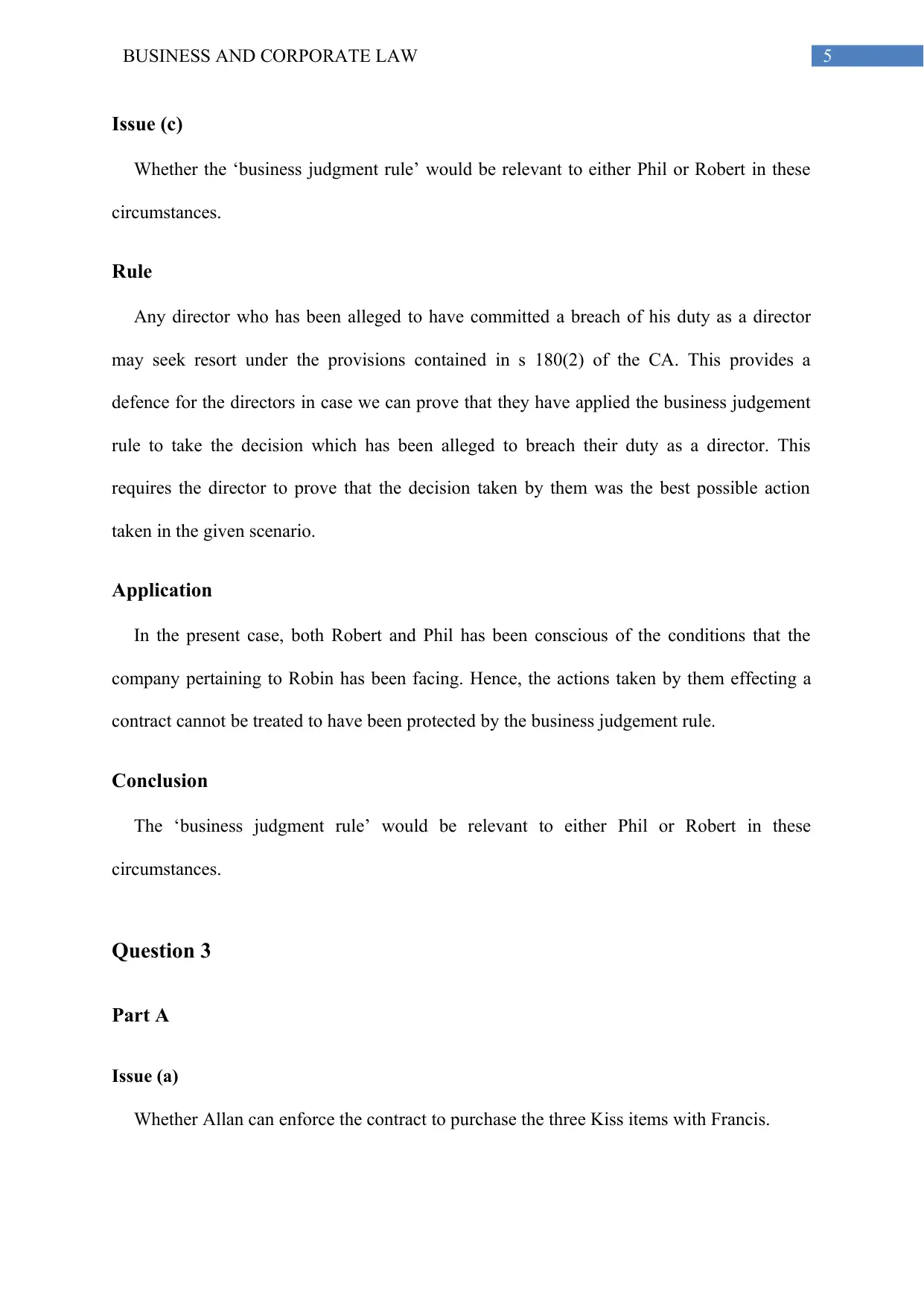
5BUSINESS AND CORPORATE LAW
Issue (c)
Whether the ‘business judgment rule’ would be relevant to either Phil or Robert in these
circumstances.
Rule
Any director who has been alleged to have committed a breach of his duty as a director
may seek resort under the provisions contained in s 180(2) of the CA. This provides a
defence for the directors in case we can prove that they have applied the business judgement
rule to take the decision which has been alleged to breach their duty as a director. This
requires the director to prove that the decision taken by them was the best possible action
taken in the given scenario.
Application
In the present case, both Robert and Phil has been conscious of the conditions that the
company pertaining to Robin has been facing. Hence, the actions taken by them effecting a
contract cannot be treated to have been protected by the business judgement rule.
Conclusion
The ‘business judgment rule’ would be relevant to either Phil or Robert in these
circumstances.
Question 3
Part A
Issue (a)
Whether Allan can enforce the contract to purchase the three Kiss items with Francis.
Issue (c)
Whether the ‘business judgment rule’ would be relevant to either Phil or Robert in these
circumstances.
Rule
Any director who has been alleged to have committed a breach of his duty as a director
may seek resort under the provisions contained in s 180(2) of the CA. This provides a
defence for the directors in case we can prove that they have applied the business judgement
rule to take the decision which has been alleged to breach their duty as a director. This
requires the director to prove that the decision taken by them was the best possible action
taken in the given scenario.
Application
In the present case, both Robert and Phil has been conscious of the conditions that the
company pertaining to Robin has been facing. Hence, the actions taken by them effecting a
contract cannot be treated to have been protected by the business judgement rule.
Conclusion
The ‘business judgment rule’ would be relevant to either Phil or Robert in these
circumstances.
Question 3
Part A
Issue (a)
Whether Allan can enforce the contract to purchase the three Kiss items with Francis.
⊘ This is a preview!⊘
Do you want full access?
Subscribe today to unlock all pages.

Trusted by 1+ million students worldwide
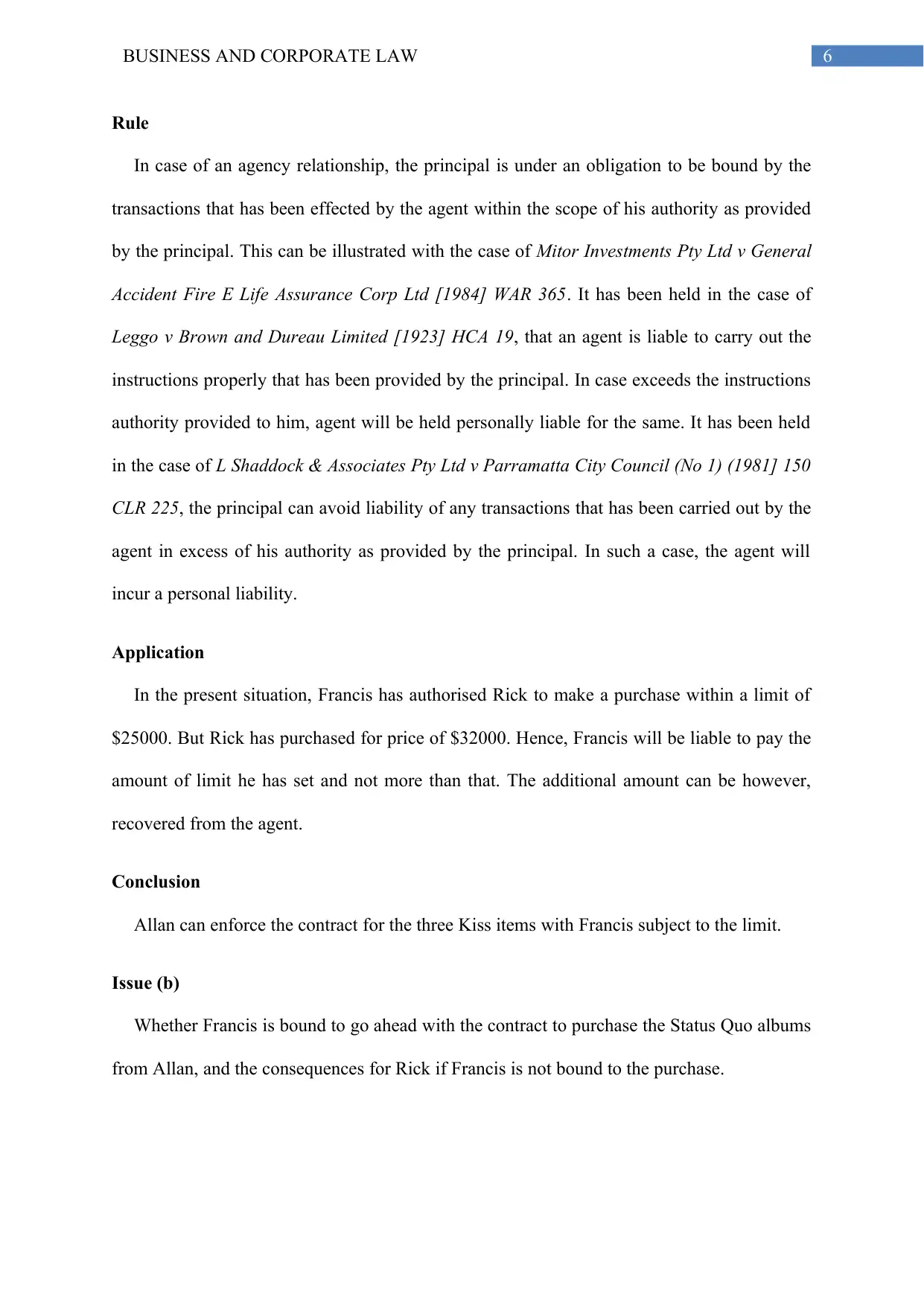
6BUSINESS AND CORPORATE LAW
Rule
In case of an agency relationship, the principal is under an obligation to be bound by the
transactions that has been effected by the agent within the scope of his authority as provided
by the principal. This can be illustrated with the case of Mitor Investments Pty Ltd v General
Accident Fire E Life Assurance Corp Ltd [1984] WAR 365. It has been held in the case of
Leggo v Brown and Dureau Limited [1923] HCA 19, that an agent is liable to carry out the
instructions properly that has been provided by the principal. In case exceeds the instructions
authority provided to him, agent will be held personally liable for the same. It has been held
in the case of L Shaddock & Associates Pty Ltd v Parramatta City Council (No 1) (1981] 150
CLR 225, the principal can avoid liability of any transactions that has been carried out by the
agent in excess of his authority as provided by the principal. In such a case, the agent will
incur a personal liability.
Application
In the present situation, Francis has authorised Rick to make a purchase within a limit of
$25000. But Rick has purchased for price of $32000. Hence, Francis will be liable to pay the
amount of limit he has set and not more than that. The additional amount can be however,
recovered from the agent.
Conclusion
Allan can enforce the contract for the three Kiss items with Francis subject to the limit.
Issue (b)
Whether Francis is bound to go ahead with the contract to purchase the Status Quo albums
from Allan, and the consequences for Rick if Francis is not bound to the purchase.
Rule
In case of an agency relationship, the principal is under an obligation to be bound by the
transactions that has been effected by the agent within the scope of his authority as provided
by the principal. This can be illustrated with the case of Mitor Investments Pty Ltd v General
Accident Fire E Life Assurance Corp Ltd [1984] WAR 365. It has been held in the case of
Leggo v Brown and Dureau Limited [1923] HCA 19, that an agent is liable to carry out the
instructions properly that has been provided by the principal. In case exceeds the instructions
authority provided to him, agent will be held personally liable for the same. It has been held
in the case of L Shaddock & Associates Pty Ltd v Parramatta City Council (No 1) (1981] 150
CLR 225, the principal can avoid liability of any transactions that has been carried out by the
agent in excess of his authority as provided by the principal. In such a case, the agent will
incur a personal liability.
Application
In the present situation, Francis has authorised Rick to make a purchase within a limit of
$25000. But Rick has purchased for price of $32000. Hence, Francis will be liable to pay the
amount of limit he has set and not more than that. The additional amount can be however,
recovered from the agent.
Conclusion
Allan can enforce the contract for the three Kiss items with Francis subject to the limit.
Issue (b)
Whether Francis is bound to go ahead with the contract to purchase the Status Quo albums
from Allan, and the consequences for Rick if Francis is not bound to the purchase.
Paraphrase This Document
Need a fresh take? Get an instant paraphrase of this document with our AI Paraphraser
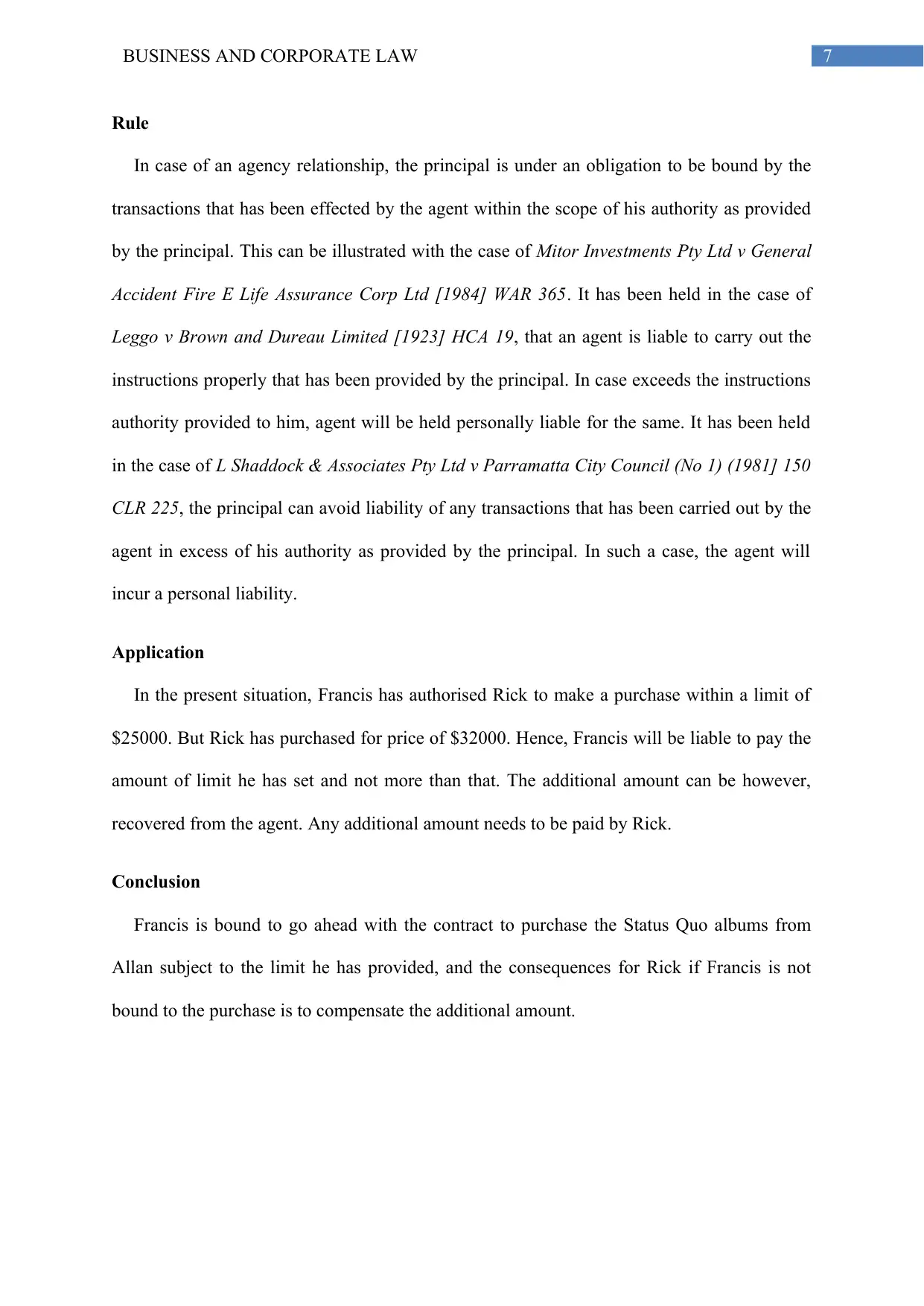
7BUSINESS AND CORPORATE LAW
Rule
In case of an agency relationship, the principal is under an obligation to be bound by the
transactions that has been effected by the agent within the scope of his authority as provided
by the principal. This can be illustrated with the case of Mitor Investments Pty Ltd v General
Accident Fire E Life Assurance Corp Ltd [1984] WAR 365. It has been held in the case of
Leggo v Brown and Dureau Limited [1923] HCA 19, that an agent is liable to carry out the
instructions properly that has been provided by the principal. In case exceeds the instructions
authority provided to him, agent will be held personally liable for the same. It has been held
in the case of L Shaddock & Associates Pty Ltd v Parramatta City Council (No 1) (1981] 150
CLR 225, the principal can avoid liability of any transactions that has been carried out by the
agent in excess of his authority as provided by the principal. In such a case, the agent will
incur a personal liability.
Application
In the present situation, Francis has authorised Rick to make a purchase within a limit of
$25000. But Rick has purchased for price of $32000. Hence, Francis will be liable to pay the
amount of limit he has set and not more than that. The additional amount can be however,
recovered from the agent. Any additional amount needs to be paid by Rick.
Conclusion
Francis is bound to go ahead with the contract to purchase the Status Quo albums from
Allan subject to the limit he has provided, and the consequences for Rick if Francis is not
bound to the purchase is to compensate the additional amount.
Rule
In case of an agency relationship, the principal is under an obligation to be bound by the
transactions that has been effected by the agent within the scope of his authority as provided
by the principal. This can be illustrated with the case of Mitor Investments Pty Ltd v General
Accident Fire E Life Assurance Corp Ltd [1984] WAR 365. It has been held in the case of
Leggo v Brown and Dureau Limited [1923] HCA 19, that an agent is liable to carry out the
instructions properly that has been provided by the principal. In case exceeds the instructions
authority provided to him, agent will be held personally liable for the same. It has been held
in the case of L Shaddock & Associates Pty Ltd v Parramatta City Council (No 1) (1981] 150
CLR 225, the principal can avoid liability of any transactions that has been carried out by the
agent in excess of his authority as provided by the principal. In such a case, the agent will
incur a personal liability.
Application
In the present situation, Francis has authorised Rick to make a purchase within a limit of
$25000. But Rick has purchased for price of $32000. Hence, Francis will be liable to pay the
amount of limit he has set and not more than that. The additional amount can be however,
recovered from the agent. Any additional amount needs to be paid by Rick.
Conclusion
Francis is bound to go ahead with the contract to purchase the Status Quo albums from
Allan subject to the limit he has provided, and the consequences for Rick if Francis is not
bound to the purchase is to compensate the additional amount.
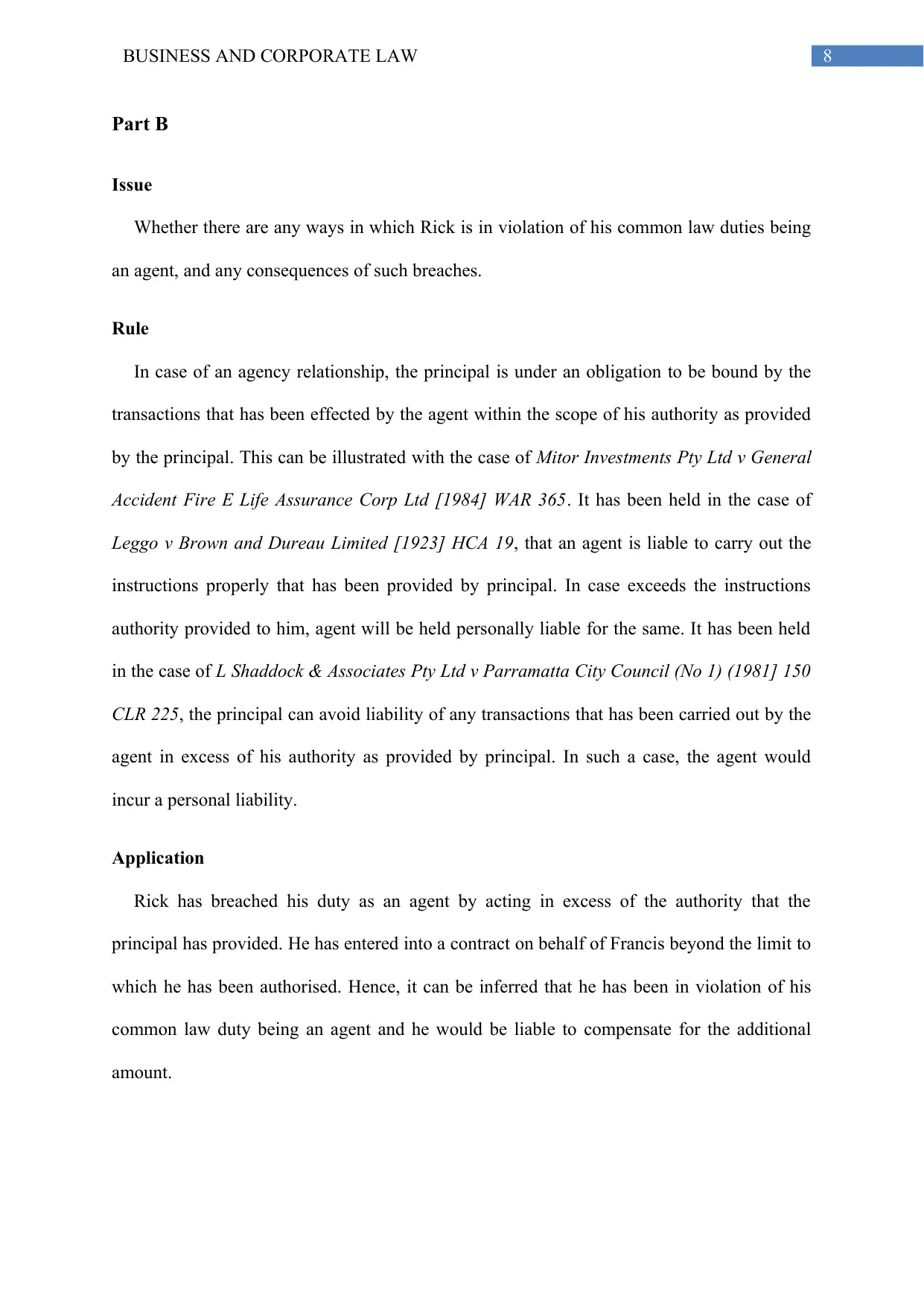
8BUSINESS AND CORPORATE LAW
Part B
Issue
Whether there are any ways in which Rick is in violation of his common law duties being
an agent, and any consequences of such breaches.
Rule
In case of an agency relationship, the principal is under an obligation to be bound by the
transactions that has been effected by the agent within the scope of his authority as provided
by the principal. This can be illustrated with the case of Mitor Investments Pty Ltd v General
Accident Fire E Life Assurance Corp Ltd [1984] WAR 365. It has been held in the case of
Leggo v Brown and Dureau Limited [1923] HCA 19, that an agent is liable to carry out the
instructions properly that has been provided by principal. In case exceeds the instructions
authority provided to him, agent will be held personally liable for the same. It has been held
in the case of L Shaddock & Associates Pty Ltd v Parramatta City Council (No 1) (1981] 150
CLR 225, the principal can avoid liability of any transactions that has been carried out by the
agent in excess of his authority as provided by principal. In such a case, the agent would
incur a personal liability.
Application
Rick has breached his duty as an agent by acting in excess of the authority that the
principal has provided. He has entered into a contract on behalf of Francis beyond the limit to
which he has been authorised. Hence, it can be inferred that he has been in violation of his
common law duty being an agent and he would be liable to compensate for the additional
amount.
Part B
Issue
Whether there are any ways in which Rick is in violation of his common law duties being
an agent, and any consequences of such breaches.
Rule
In case of an agency relationship, the principal is under an obligation to be bound by the
transactions that has been effected by the agent within the scope of his authority as provided
by the principal. This can be illustrated with the case of Mitor Investments Pty Ltd v General
Accident Fire E Life Assurance Corp Ltd [1984] WAR 365. It has been held in the case of
Leggo v Brown and Dureau Limited [1923] HCA 19, that an agent is liable to carry out the
instructions properly that has been provided by principal. In case exceeds the instructions
authority provided to him, agent will be held personally liable for the same. It has been held
in the case of L Shaddock & Associates Pty Ltd v Parramatta City Council (No 1) (1981] 150
CLR 225, the principal can avoid liability of any transactions that has been carried out by the
agent in excess of his authority as provided by principal. In such a case, the agent would
incur a personal liability.
Application
Rick has breached his duty as an agent by acting in excess of the authority that the
principal has provided. He has entered into a contract on behalf of Francis beyond the limit to
which he has been authorised. Hence, it can be inferred that he has been in violation of his
common law duty being an agent and he would be liable to compensate for the additional
amount.
⊘ This is a preview!⊘
Do you want full access?
Subscribe today to unlock all pages.

Trusted by 1+ million students worldwide
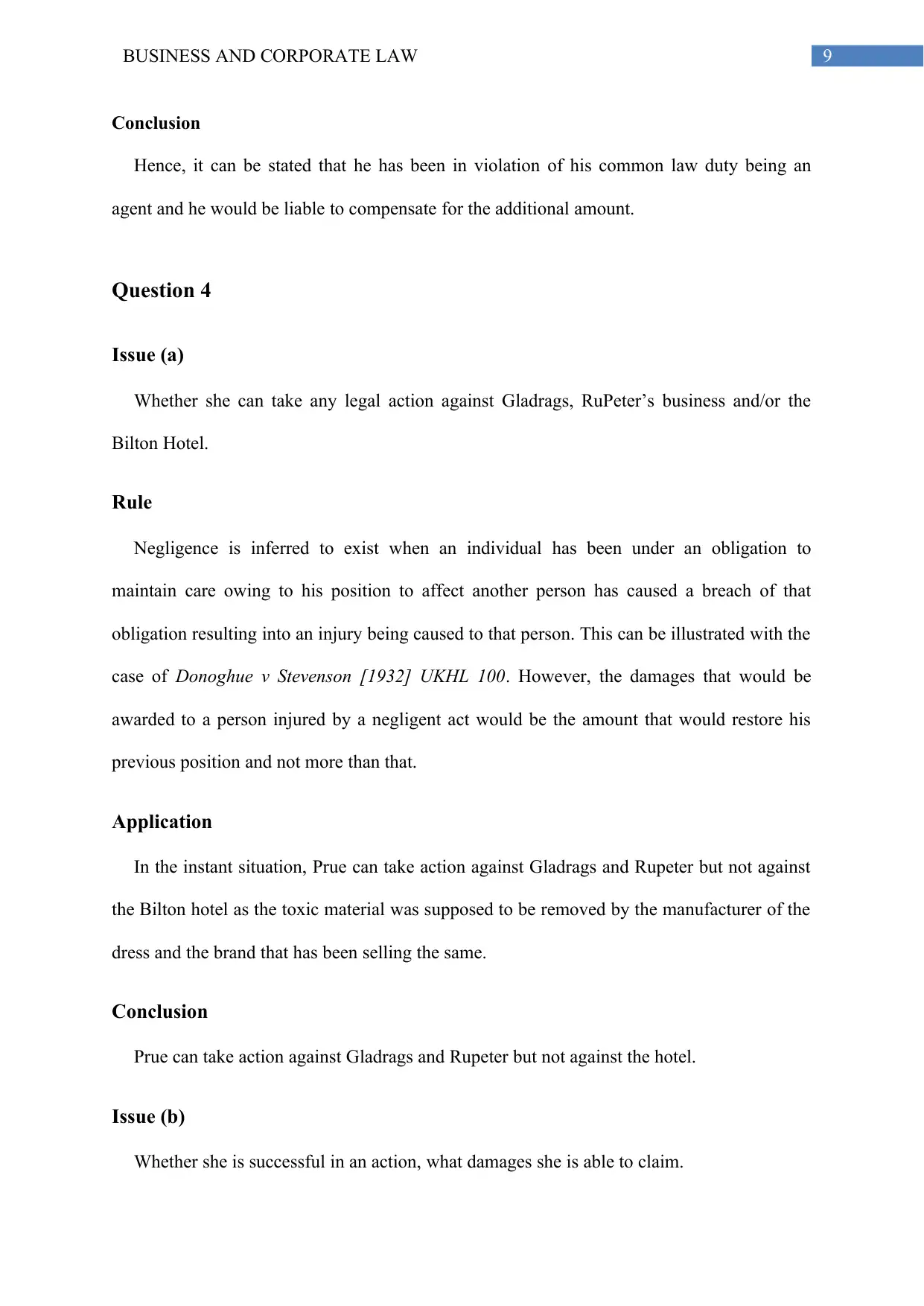
9BUSINESS AND CORPORATE LAW
Conclusion
Hence, it can be stated that he has been in violation of his common law duty being an
agent and he would be liable to compensate for the additional amount.
Question 4
Issue (a)
Whether she can take any legal action against Gladrags, RuPeter’s business and/or the
Bilton Hotel.
Rule
Negligence is inferred to exist when an individual has been under an obligation to
maintain care owing to his position to affect another person has caused a breach of that
obligation resulting into an injury being caused to that person. This can be illustrated with the
case of Donoghue v Stevenson [1932] UKHL 100. However, the damages that would be
awarded to a person injured by a negligent act would be the amount that would restore his
previous position and not more than that.
Application
In the instant situation, Prue can take action against Gladrags and Rupeter but not against
the Bilton hotel as the toxic material was supposed to be removed by the manufacturer of the
dress and the brand that has been selling the same.
Conclusion
Prue can take action against Gladrags and Rupeter but not against the hotel.
Issue (b)
Whether she is successful in an action, what damages she is able to claim.
Conclusion
Hence, it can be stated that he has been in violation of his common law duty being an
agent and he would be liable to compensate for the additional amount.
Question 4
Issue (a)
Whether she can take any legal action against Gladrags, RuPeter’s business and/or the
Bilton Hotel.
Rule
Negligence is inferred to exist when an individual has been under an obligation to
maintain care owing to his position to affect another person has caused a breach of that
obligation resulting into an injury being caused to that person. This can be illustrated with the
case of Donoghue v Stevenson [1932] UKHL 100. However, the damages that would be
awarded to a person injured by a negligent act would be the amount that would restore his
previous position and not more than that.
Application
In the instant situation, Prue can take action against Gladrags and Rupeter but not against
the Bilton hotel as the toxic material was supposed to be removed by the manufacturer of the
dress and the brand that has been selling the same.
Conclusion
Prue can take action against Gladrags and Rupeter but not against the hotel.
Issue (b)
Whether she is successful in an action, what damages she is able to claim.
Paraphrase This Document
Need a fresh take? Get an instant paraphrase of this document with our AI Paraphraser
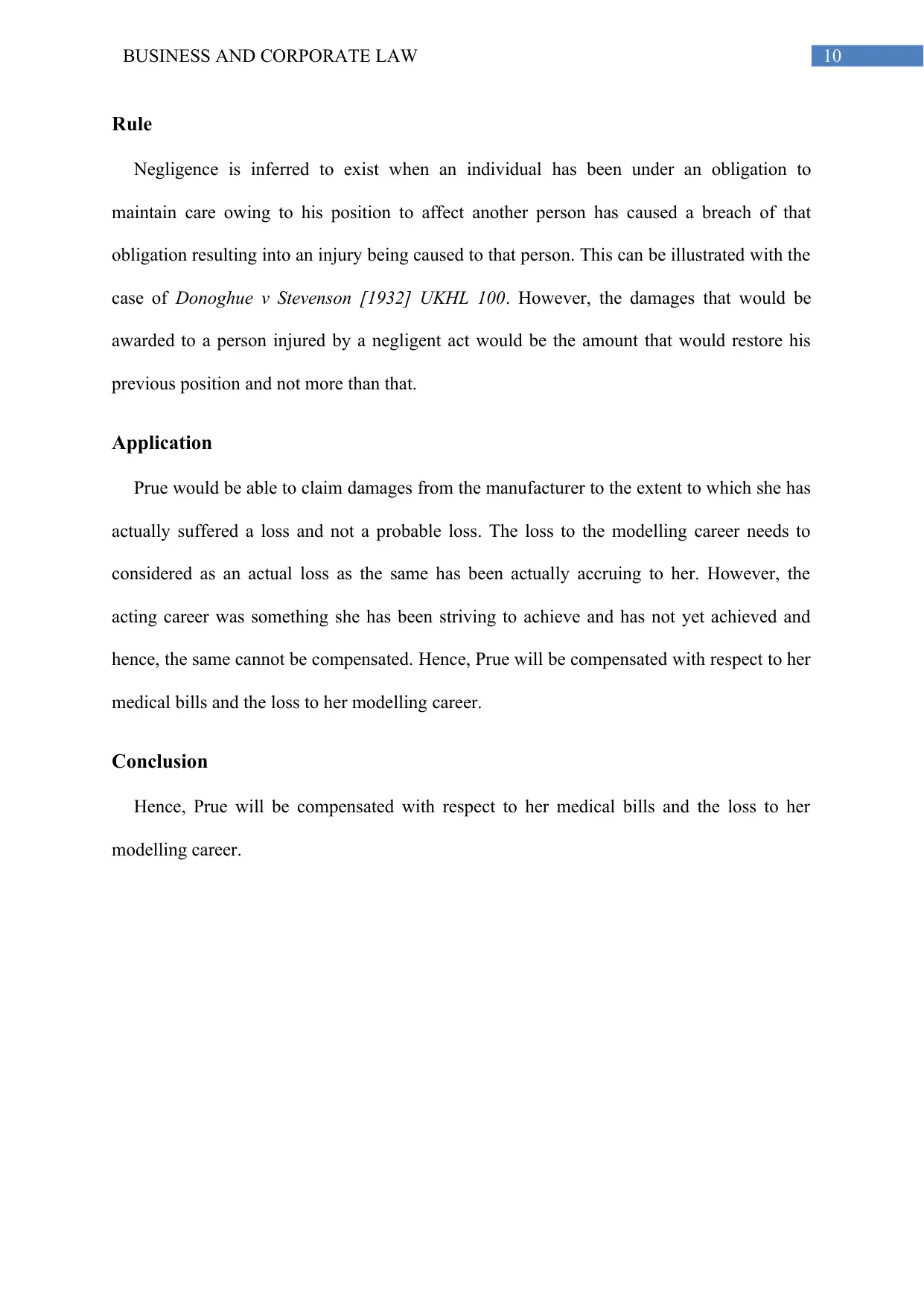
10BUSINESS AND CORPORATE LAW
Rule
Negligence is inferred to exist when an individual has been under an obligation to
maintain care owing to his position to affect another person has caused a breach of that
obligation resulting into an injury being caused to that person. This can be illustrated with the
case of Donoghue v Stevenson [1932] UKHL 100. However, the damages that would be
awarded to a person injured by a negligent act would be the amount that would restore his
previous position and not more than that.
Application
Prue would be able to claim damages from the manufacturer to the extent to which she has
actually suffered a loss and not a probable loss. The loss to the modelling career needs to
considered as an actual loss as the same has been actually accruing to her. However, the
acting career was something she has been striving to achieve and has not yet achieved and
hence, the same cannot be compensated. Hence, Prue will be compensated with respect to her
medical bills and the loss to her modelling career.
Conclusion
Hence, Prue will be compensated with respect to her medical bills and the loss to her
modelling career.
Rule
Negligence is inferred to exist when an individual has been under an obligation to
maintain care owing to his position to affect another person has caused a breach of that
obligation resulting into an injury being caused to that person. This can be illustrated with the
case of Donoghue v Stevenson [1932] UKHL 100. However, the damages that would be
awarded to a person injured by a negligent act would be the amount that would restore his
previous position and not more than that.
Application
Prue would be able to claim damages from the manufacturer to the extent to which she has
actually suffered a loss and not a probable loss. The loss to the modelling career needs to
considered as an actual loss as the same has been actually accruing to her. However, the
acting career was something she has been striving to achieve and has not yet achieved and
hence, the same cannot be compensated. Hence, Prue will be compensated with respect to her
medical bills and the loss to her modelling career.
Conclusion
Hence, Prue will be compensated with respect to her medical bills and the loss to her
modelling career.
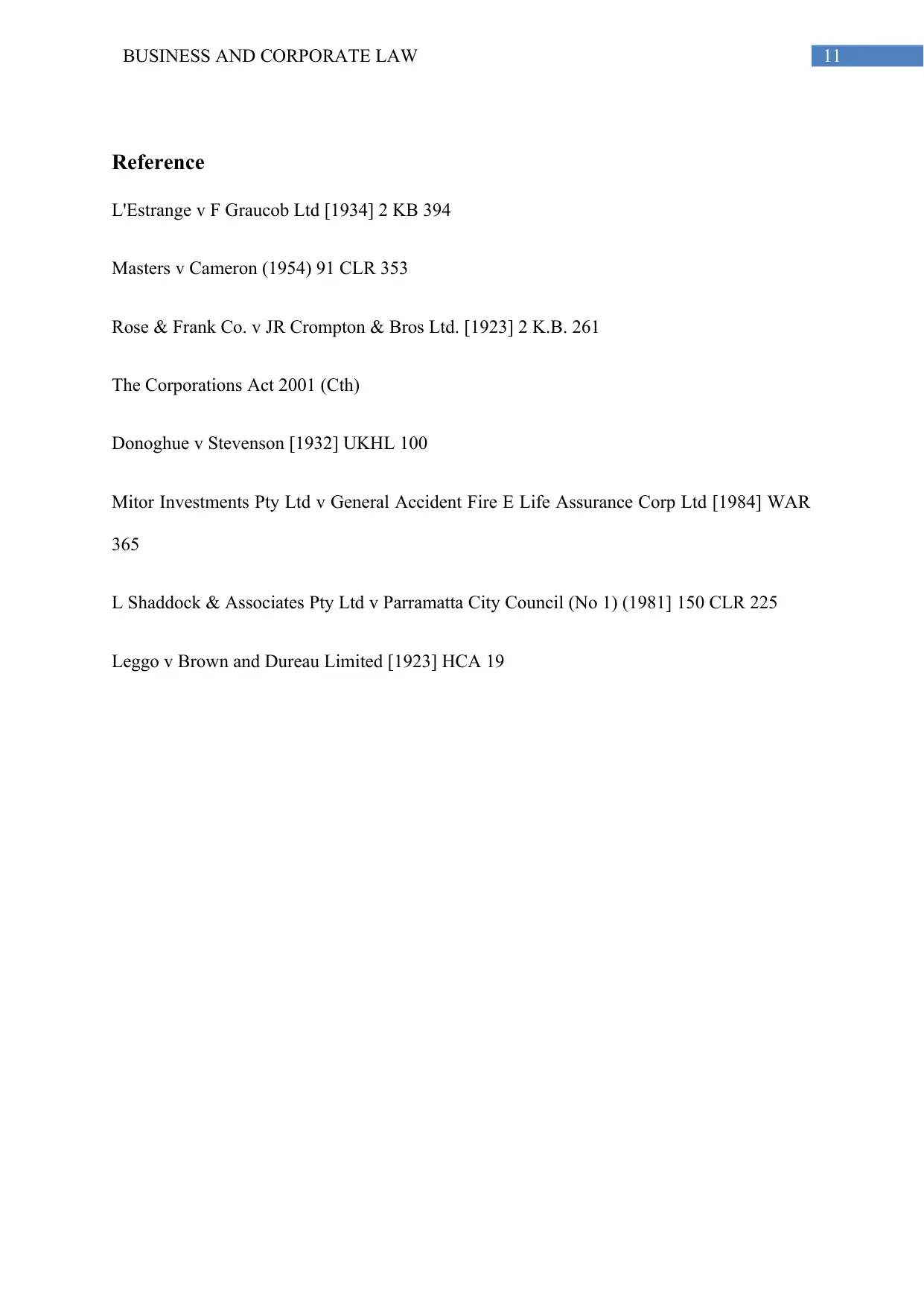
11BUSINESS AND CORPORATE LAW
Reference
L'Estrange v F Graucob Ltd [1934] 2 KB 394
Masters v Cameron (1954) 91 CLR 353
Rose & Frank Co. v JR Crompton & Bros Ltd. [1923] 2 K.B. 261
The Corporations Act 2001 (Cth)
Donoghue v Stevenson [1932] UKHL 100
Mitor Investments Pty Ltd v General Accident Fire E Life Assurance Corp Ltd [1984] WAR
365
L Shaddock & Associates Pty Ltd v Parramatta City Council (No 1) (1981] 150 CLR 225
Leggo v Brown and Dureau Limited [1923] HCA 19
Reference
L'Estrange v F Graucob Ltd [1934] 2 KB 394
Masters v Cameron (1954) 91 CLR 353
Rose & Frank Co. v JR Crompton & Bros Ltd. [1923] 2 K.B. 261
The Corporations Act 2001 (Cth)
Donoghue v Stevenson [1932] UKHL 100
Mitor Investments Pty Ltd v General Accident Fire E Life Assurance Corp Ltd [1984] WAR
365
L Shaddock & Associates Pty Ltd v Parramatta City Council (No 1) (1981] 150 CLR 225
Leggo v Brown and Dureau Limited [1923] HCA 19
⊘ This is a preview!⊘
Do you want full access?
Subscribe today to unlock all pages.

Trusted by 1+ million students worldwide
1 out of 12
Related Documents
Your All-in-One AI-Powered Toolkit for Academic Success.
+13062052269
info@desklib.com
Available 24*7 on WhatsApp / Email
![[object Object]](/_next/static/media/star-bottom.7253800d.svg)
Unlock your academic potential
Copyright © 2020–2026 A2Z Services. All Rights Reserved. Developed and managed by ZUCOL.




